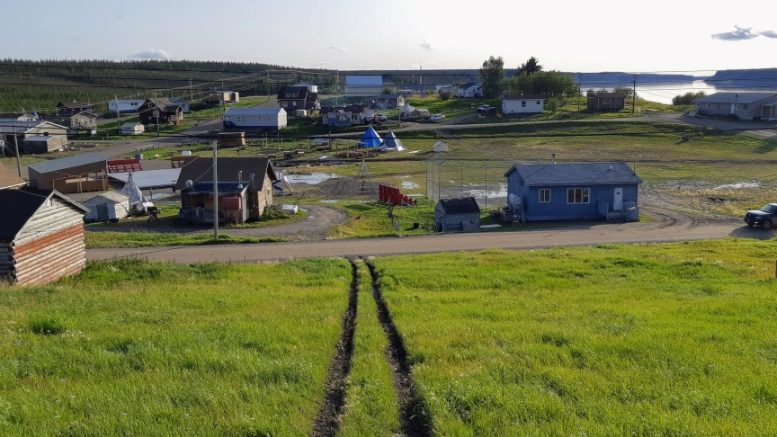Rose McNeely was walking to work last Wednesday morning when she saw something dark in the road.
Initially, she thought it was a garbage bag or maybe even a caribou hide.
It was still dark out, so she went home to get her husband. They drove back to the spot and he realized that it was their dog Nana crumpled on the ground. Rose took the dog after her father passed away in 2021. According to the family, the dog only understood Slavey.
McNeely’s husband then went to check on another one of their dogs, Hooter, and found it dead as well.
The two dogs looked like they’d been attacked.
“It looks like they ate all the insides,” says McNeely.
“Officers assessed the situation – both by chatting with folks affected about the circumstances of their dogs’ deaths and by looking at the fact we’d had wolf sightings in the community recently – and determined the most likely culprit was wolves,” says Mike Westwick, spokesperson for Environment and Natural Resources.
‘Never had a chance’
The McNeelys take care of three other family dogs, which Rose says she kept locked on the deck of her house.
“After they killed the two dogs, they’re gonna come back for the rest,” says Rose. “Everybody was saying that.”
That turned out to be true. McNeely remembers being woken up early Thursday or Friday morning by barking outside. She says her and her husband looked out the windows on either side of the house and they saw two wolves. By the time they got their gun, the animals had run off.
However, ENR confirmed three dogs total were killed last week. McNeely thinks the third belonged to a neighbour.
“We never heard them yell or anything,” says McNeely. “It looked like they never had a chance to fight because the first thing the wolf probably did was jump on them and got their neck.”
In the days after the attack, McNeely said it was scary; she cautioned her grandchildren not to walk around.
Over the weekend, though, McNeely says she received “good news” that trappers and ENR officers caught three wolves.
Westwick says officers will continue to monitor the area and trappers still have snares set around the community.
McNeely says she heard of other dogs that went missing in the last couple of months, and assumes it was wolves.
After her dogs were killed, “I couldn’t just let this happen,” she says. “I was just so sad, I had to do something,” so she reported the encounter with ENR.
“The most common problem we see with wolves is aggression towards dogs. A wolf sees a dog as a ‘trespassing wolf’ that should be driven away or killed. Wolves can be aggressive towards dogs at any time, but especially leading up to and during the breeding season (December – February) and the denning period (April – May), or if wolf pups are nearby,” said Westwick.
The department is advising residents to keep dogs inside, if possible, and to reduce attractants like food and garbage outside.
“Tying dogs up outside can limit the dog’s ability to reach safety,” he said.
Any residents that see a wolf or other dangerous wildlife should call ENR’s Sahtú regional office wildlife emergency line at 867-587-2422.






